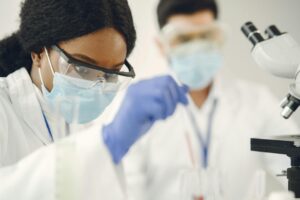In the scientific world, reproducibility and accuracy are key to progress. One factor often overlooked until something goes wrong is the lab instruments that function perfectly every day.
From biotech startups to large pharmaceutical companies, labs depend on a range of sensitive, high-value instruments like incubators, spectrophotometers, shakers, and PCR machines. But what happens when these devices fail? For most labs, even one day of instrument downtime can result in lost samples, delays in essential research, and failure to meet regulatory requirements.
This is where a lab instrument repair service provider like Peak BioServices becomes not just a support partner, but a crucial necessity.
Why Every Lab Needs a Trusted Lab Instrument Repair Service Provider
A dedicated lab instrument repair partner does much more than fix broken equipment. The best providers ensure uptime, reduce unexpected failures, and offer certified calibration and validation that comply with specific industry regulations such as:
– FDA 21 CFR Part 11
– ISO/IEC 17025
– USP <1058> Instrument Qualification
– GMP/GLP compliance
Many labs today operate under tighter budgets and smaller teams, especially following COVID-19, when remote and hybrid workflows have become common. Outsourcing lab repairs helps eliminate the need for in-house specialists for various instruments while ensuring expert service.
Lab Incubator Repair: The Silent Risk That Labs Can’t Afford
Among all lab equipment, incubators—whether CO₂, refrigerated, or shaking types—play a special role. They aren’t just storage devices; they are environments for cell cultures, microbiological growth, tissue engineering, and biochemical studies. When an incubator fails, the damage goes beyond operational issues; it can impact biological results. Investing and nourishing relationships with a good lab incubator repair service partner can come in handy, for the potential incubator issues that we will describe below.
Common Lab Incubator Issues
– Temperature Inconsistency: Even a 1–2°C change can disrupt enzyme reactions or harm cell viability.
– CO₂ Sensor Malfunction: Improper gas regulation can affect cellular pH balance and growth rates.
– Humidity System Failure: A decrease in humidity can lead to culture desiccation or affect evaporation-sensitive experiments.
– Contamination and Biofilm Build-Up: Poorly maintained incubators can foster mold and bacteria, posing a risk of cross-contamination.
According to a 2023 survey by BioInTech Solutions, lab incubator failures account for nearly 24% of all time-sensitive sample losses in academic and biotech labs. Alarmingly, only 58% of labs had a formal preventive maintenance agreement for their incubators.
What Makes a Good Lab Instrument Repair Partner?
When looking for a lab instrument repair service provider, not all companies offer the same skills. Some specialize only in brand-specific OEM instruments, while others provide multi-vendor expertise for faster diagnosis and service across a full range of equipment.
Key Traits of a Reliable Repair Partner
– Multi-Brand, Multi-Instrument Capabilities: Can service Thermo Fisher incubators one day and Agilent spectrophotometers the next.
– On-Site vs Depot Repair Options: Flexibility to send technicians on-site or ship instruments to certified service centers.
– Fast Turnaround Times: Average downtime with top providers is reduced by 45% compared to internal troubleshooting (source: LabRepair Index, 2023).
– Certified Technicians & Calibrations: Look for ISO 9001 or ISO 13485-certified firms with access to NIST-traceable calibration tools.
– Custom Maintenance Plans: Preventive care plans with scheduled inspections can extend equipment lifespan by 30–50%.
Case Study: Incubator Downtime at a Biotech Startup
A fast-growing biotech startup in Boston recently faced an incubator failure that resulted in over $85,000 in lost cell lines and growth media, plus a 3-week project delay. The cause? A faulty CO₂ sensor wasn’t addressed in time.
They later partnered with a third-party lab repair service provider that offered 24-hour response times, quarterly calibrations, and data logging support. Since then, their incubators have maintained over 99.8% uptime.
What LabioScientific Readers Should Know: Insights for 2025 and Beyond
As we progress into a time dominated by data-driven research and AI-driven diagnostics, instrument reliability has become essential. Several trends are impacting the lab equipment repair field:
1. Predictive Diagnostics with IoT Integration: Smart incubators and instruments now offer remote monitoring. Some service providers connect with these tools to anticipate failures before they occur, reducing emergency repairs.
2. Environmental Compliance: With sustainability gaining importance, lab repair services increasingly emphasize repair-over-replace strategies. A recent study by GreenLabs Alliance found that extending an instrument’s lifespan by just 2 years can cut e-waste by 32% in mid-sized labs.
3. Rise in Remote Service Capabilities: Some companies now provide virtual diagnostics and calibration, especially for software-related issues or firmware updates. This approach helps lower repair costs and minimizes instrument handling.
How Often Should Lab Incubators Be Serviced?
Experts recommend:
– Quarterly inspections for high-use labs (clinical, pharma)
– Semi-annual service for academic or moderate-use environments
– Immediate service when there are any signs of temperature or gas regulation problems
A good lab instrument repair partner typically provides detailed logs, certification of compliance, and may suggest planning for replacement parts to avoid future surprises.
The Cost of Not Investing in Repairs
Labs may be tempted to delay service due to budget issues. However, deferred maintenance often leads to:
– Higher long-term costs from major breakdowns
– Failed audits or non-compliance notices
– Loss of valuable experiments or biologics
– Decreased researcher productivity
A recent survey by InstrumentCare Analytics (2024) showed that labs with scheduled service contracts experienced 28% fewer critical failures than those relying only on ad hoc repairs.
Final Thoughts: Maintenance Is Mission-Critical
Laboratories are only as efficient as their equipment. From incubators that support the building blocks of life to analytical tools that reveal molecular secrets, every piece of lab equipment needs professional care.
By investing in a certified, responsive, and informed lab instrument repair service provider like Peak BioServices, labs can protect research integrity, maximize equipment investments, and maintain operational excellence in an ever-competitive and regulated environment.




